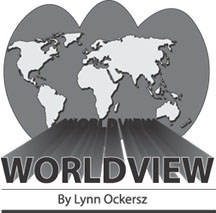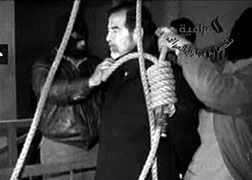|
observer |
|
|
|
|
|
OTHER LINKS |

|

|

|
Global power inequalities and the Saddam trial
The execution of former Iraqi strongman Saddam Hussain has triggered an avalanche of views and commentary from around the world on the fairness and correctness of what passed off as the judicial procedure which ended his life. For example, objection is raised in some quarters that Saddam was tried and executed for what was believed to be the least of his crimes: the murder of some 144 villagers in the town of Dujail who were accused of being implicated in a plot to kill Saddam in 1982. They point out that worse excesses and abuses could have been laid at Saddam's doorstep. For instance, the massacre of Kurdish rebels in 1988 and the ruthless suppression of the Shia revolt of 1991. Whereas, Saddam should have faced trial for the latter massacres too, or for the excesses and irregularities committed by his regime in the 10-year Iran-Iraq war, he was tried and executed for the least of his crimes, the Dujail bloodletting, runs this argument. Other commentators and analysts point out that Saddam should have been tried, ideally, by an international war crimes tribunal on neutral soil. ExecutedWhereas he was tried and executed by an administration which would certainly have had a vested interest in seeing an end to the former Iraqi strongman. They rightly point out that the mere gut emotion of seeking revenge on the part of a Shia-dominated Iraqi regime, besides political expediency by it, played a significant role in the ending of Saddam's life. The poser is also raised in some sections on as to why the Saddam trial was rushed through by the US-backed, current Iraqi administration. Did the US have too much to hide in the Iraqi dictator's murky past?, is also a prime question. This range of objections to the Saddam trial and execution are all immensely relevant and need to be strongly considered by the world community. However, a fundamental point which needs to be unhesitatingly recognized by all responsible opinion is that Saddam should have faced a fair trial for even "the least" of the lives he is believed to have snuffed out. The greatness or smallness of the excess should not be made an issue in view of the priceless preciousness of even the "least" life on earth. A tendency to forget this fundamental truth could contribute greatly towards aggravating and intensifying the "culture of death" which is currently enveloping the world system. However, there is no denying that Saddam should have faced trial for all the crimes he is accused of. This would have provided a wealth of information which is of immense use to humanity. One of the biggest legal and ethical posers, however, to emerge from the Saddam execution is the fairness of the trial. TrialIn view of the politically charged nature of the trial and considering the fact that the accusers concerned, the Shia-led government in Iraq, and the US, emerged virtual prosecutors of the accused, the highest standards of fairness would have been met - among other factors - if the trial was conducted on neutral soil, by an international tribunal, who would have had no interest in the outcome of the trial. The non-adherence to these standards reflects poorly on the trial's fairness. However, the fact that the West could virtually have its way on the question of bringing Saddam to what it considered is justice reflects the fundamental inequalities in the current world order where the West, specifically the US, wields disproportionate political and military power. Put simply, the predominant world powers could commit grave wrongs and get away with it, while the Third and Fourth Worlds are left with no choice but to bear the inequities heaped on them. Among other things, the observer is also reminded of the grossly unequal power relations which have been persisting over the years among states in the current world order. More so, why a renewed and energetic effort needs to be made to truly democratize the UN system. |










